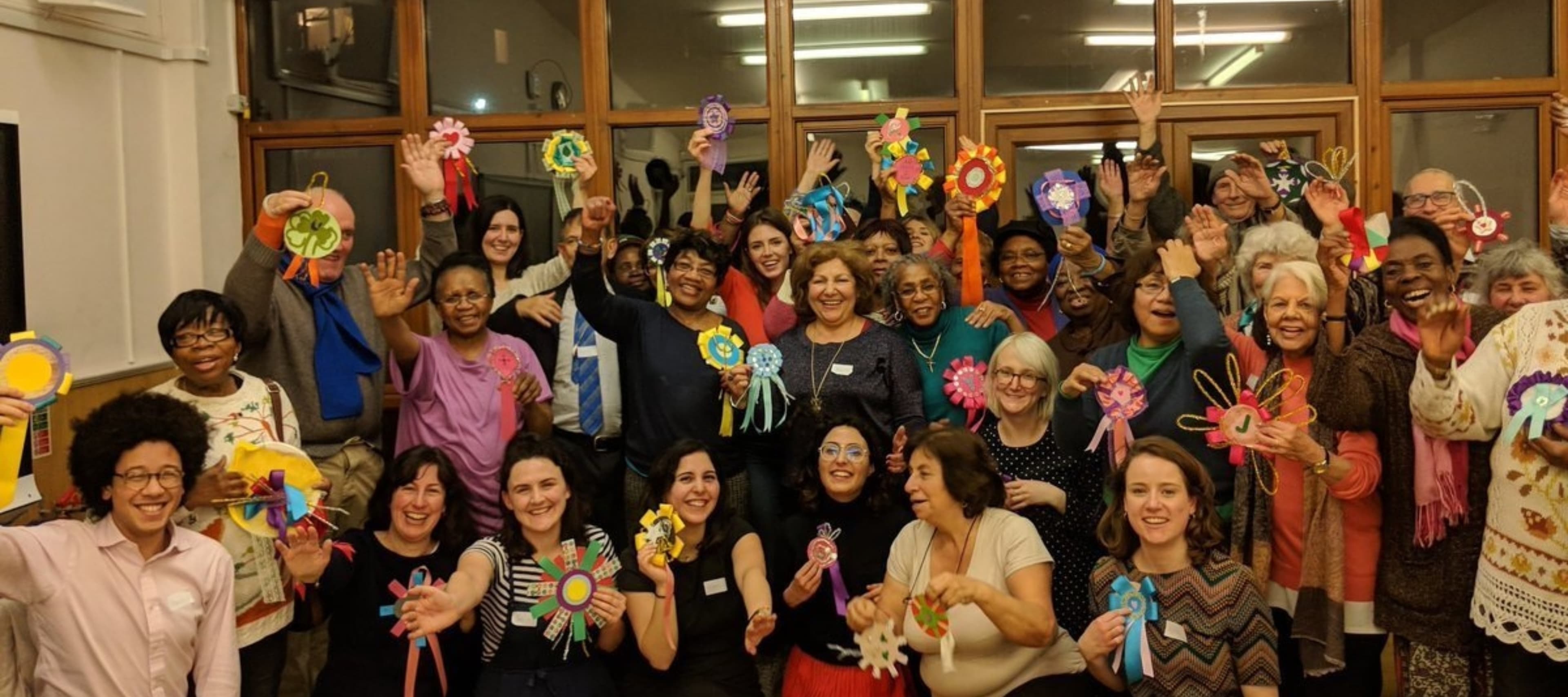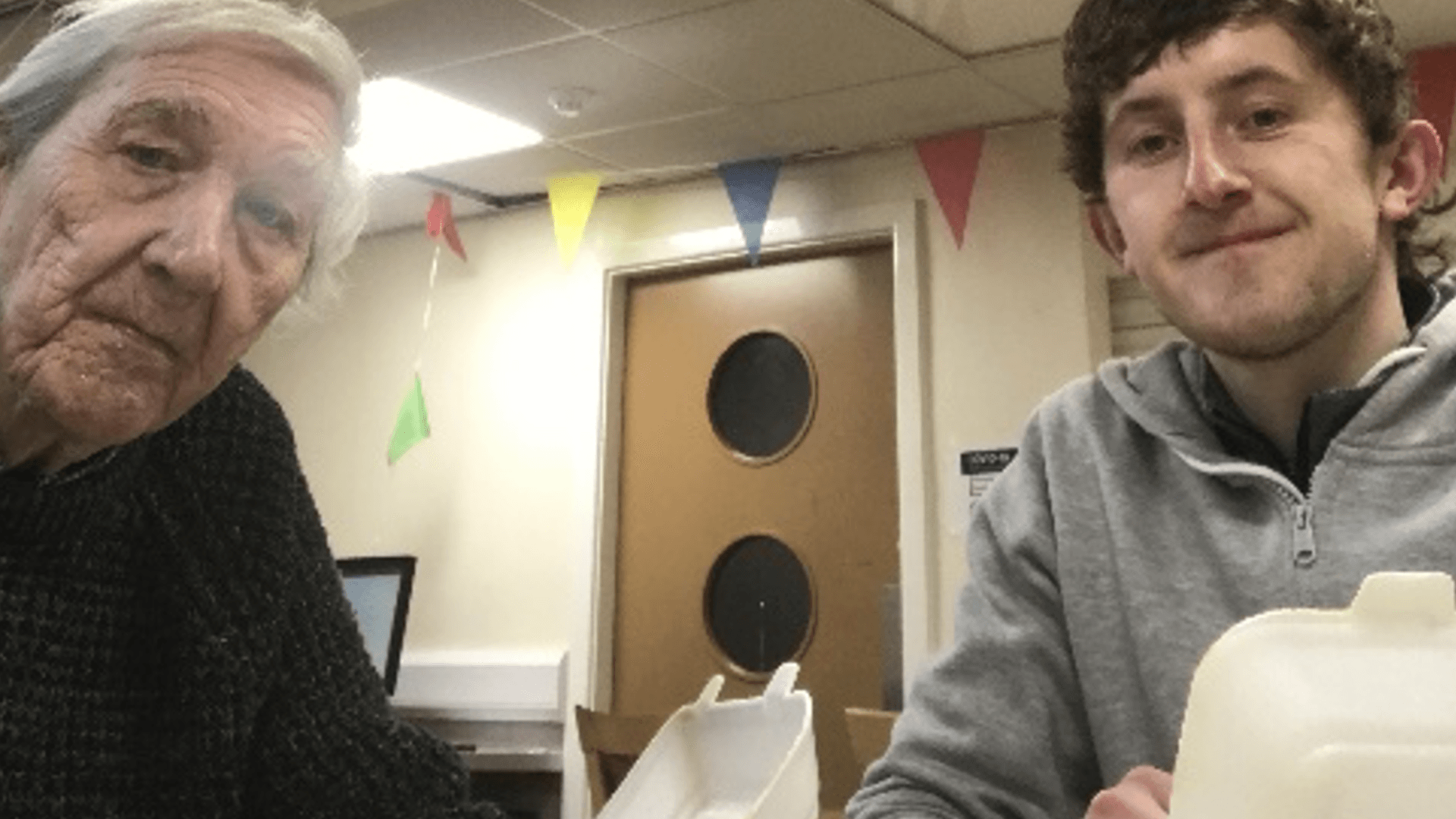
How The Cares Family reduces loneliness amongst younger and older people alike
Posted by The Cares Family on 7th October 2018
Please note: this post is 88 months old and The Cares Family is no longer operational. This post is shared for information only
In the UK, six million adults don't know any of their neighbours by name, and only a quarter of people would class their neighbours as ‘close friends’. These statistics reveal a huge deficit in neighbourliness and community across the country. They also go some way to explaining why the UK is facing what many are calling a 'loneliness epidemic'.
In that context, The Cares Family presented this week at the Campaign to End Loneliness conference. Many people there already knew that loneliness is as bad for people's health as smoking 15 cigarettes a day, and has been shown to increase the likelihood of strokes, heart attacks and clinical dementia.
But while there's long been a focus in the media on how loneliness impacts older people, The Cares Family have for many years highlighted how it affects young people equally or – as a recent survey found – perhaps even more intensely. There are many reasons for this: professional expectations, social media, FOMO (Fear of Missing Out), rising rents and moving away from family (and the emotional support they provide) to big cities in search of jobs.
But culturally, too, we are withdrawing from one another. As a society we seem to be constantly moving towards ever more time-saving, conversation-cutting exchanges. It’s now common for people to have more Twitter followers than friends 'irl' ('in real life'). Many of us get around for an entire day without talking to anyone. Our interactions are with self-service checkouts, ordering coffee through apps, ignoring others on public transport and consuming culture through solitary headphones and tiny screens. In an era when we’re purported to be more ‘connected’ than ever we’re actually living in an era of deep community disconnection.
That’s why The Cares Family specifically seeks to bring people over 65 together with people in their 20s and 30s in rapidly changing cities – for mutual friendship and fun. Those two groups – the loneliest in our age of loneliness – clearly have so much to offer one another in the shape of meaningful relationships, community and belonging.
Our first branch, North London Cares, started seven years ago and works across the inner-London boroughs of Camden and Islington. South London Cares has been running for more than four years, in the boroughs of Southwark and Lambeth. Manchester Cares opened in November 2017. And Liverpool Cares is opening this autumn with its first activity starting in the coming weeks.
Each of those local community networks – collectively known as The Cares Family – exists to reduce social isolation and loneliness in older and younger neighbours simultaneously. And in bridging the gaps between generations that we read so much about in the press, we also improve neighbours’ wellbeing, confidence, purpose and power – and we help create meaningful relationships through shared experience across social, digital and attitudinal divides.
Each of The Cares Family charities works through four core programmes.
Our Social Clubs are stereotype-smashing, informal group get togethers. Activities include reggae nights, business visits, pub clubs, boxing, dim sum making and ceilidhs. In just one week this October, Dorothy, Mick and a group of south London neighbours visited a local business to find out what happens behind the scenes at a company based in The Shard; meanwhile, Michael and the Kentish Town neighbours celebrated Oktoberfest together.

Love Your Neighbour is a one-to-one friendship-matching scheme. A younger person visits the same older neighbour at home every week for an hour or two, which helps to bring the outside world in for often housebound neighbours who can struggle to get out or feel part of their changing city. Friends have also enjoyed trips to the chippie, to football and theatre, and to celebrate special birthdays with one another.
Through our proactive Outreach work we place ourselves in the community – at GP surgeries, supermarkets, libraries, chemists, bus stops and other local places – to strike up conversations with older neighbours and to invite them to our broader activities. This programme is vital because isolation, by definition, can be hard to find.
And Community Fundraising is yet another way for local older and younger neighbours to share time, new experiences and camaraderie while supporting the network they love – by baking, taking on challenge events, organising open mic nights and attending pub quizzes.
Through The Cares Family, over seven years, 5,000 older people and 5,000 younger people have shared fun and friendship together. You can meet Joe and Robyn, Rita and Laura, Harry and Emma, Amita and Margarita, and Maisie and Chloe in our short video:
At this time of year, as we move into the winter months, our proactive outreach intensifies. As well as knocking on doors out in the community, we deliberately go to the places that people at risk of isolation are most likely to need to visit such as flu clinics, pharmacies, local shops and – because one in ten GP appointments is taken by an older person with no other condition than that they're lonely – doctors' surgeries.
And because we want to connect people to the local community, we purposefully don’t operate from fixed premises; rather, all our social clubs are hosted in all kinds of places and spaces – cafes, businesses, libraries, pubs, museums, breweries, gardens, parks and local community centres. That helps build neighbours’ confidence by showing them what's available in their local area – and by opening doors to places that some people assume are 'just for youngsters.'
The Old Red Lion in Kennington has been hosting a monthly group for South London Cares for almost three years, providing a space for older and younger neighbours to enjoy a laugh together and creating an real sense of belonging for everyone who attends. Now that John, Pat and Malcolm have become part of the pub’s fabric, they pop in outside of our social clubs for a quick chat or a Sunday roast, always knowing that there will be a friendly face to talk to.

Fostering that sense of belonging can take time. The first thing that lots of neighbours tell us is that they don’t think anyone would find them interesting. They say they’ve forgotten how to have a conversation after only having the TV for company. Indeed two in five older people in the UK say the TV is their main form of company.
Take amazing Albert, for instance: he used to be a professional boxer and a London cabbie, so he knows the city better than most. But after first meeting Albert through our outreach work it took another several phone calls for him to feel confident enough to join his first social club. At first Albert couldn't fathom why young people would want to spend time with him. He’s now been to 48 social clubs and has a Love Your Neighbour match, Graham, who he met through the Old Red Lion pub club.
Albert wrote a poem about what the Cares community means to him. One line said: “With South London Cares new chapters of life are begun”.
Albert’s poem is heartfelt. It’s sincere. It's human. And for The Cares Family, reflecting that sincerity and humanity is vital. Because what we've found is that so much of the language used by big business, big government and even some big charities can inadvertently suffocate, stifle and squeeze personality, making people feel more left behind – and more anonymous.
At The Cares Family we place huge importance on using language that reflects genuine community. So we have a particular way of talking. We never use the words "services", "residents", "clients", "befriend" or "beneficiaries" – transactional words which suggest no mutuality or civic interaction. Instead, we use words like "interaction", "friendship" and "neighbours" which speak to our values of connecting people, personalities and places for everyone's benefit.
That mutual proposition is at the core of The Cares Family's approach because it takes two people for one person to feel visible, and it takes at least two people for one person to feel neighbourliness.
Graham moved to London from Glasgow a few years ago and got involved with South London Cares because he wanted to feel part of his local community. Beforehand, he'd felt something was missing from his life. He asked to be matched with Albert after feeling inspired by his wit, humour and outrageous stories. They now regularly catch up over a cuppa, head out to watch the football, or eat at restaurants together.
Many of the neighbours in our network – like Albert – have told us that they would never have got involved if they thought their younger neighbours were providing a ‘service’. Likewise, the younger neighbours often tell us that they don’t feel they’re “doing charity” by being part of The Cares Family. Rather, they attend Social Clubs or take part in Love Your Neighbour because creating friendships with people outside of their usual bubbles makes their lives richer, more vibrant, more filled with joy.
These stories are underscored by evaluations of our work which have shown us that 73% of older people say their isolation has reduced, 81% feel better connected to others and 86% are better able to appreciate the world. And 98% of younger people involved say they have a greater connection to the community, 98% have been able to contribute in a way they otherwise would not, and 97% are more able to appreciate older people.
At a time of rapid change – of globalisation, gentrification, transience and filter bubbles that interaction for mutual benefit is key – for older people, for younger people, and for our communities. And while the 'loneliness epidemic' is heartbreaking and unsustainable, there is hope: that we can all take very simple steps to stay connected to one another, to learn from one another, and to show that we need each other.


